The clean room panels industry stands at the threshold of a decade-long expansion trajectory that promises to reshape contamination control technology, sterile environment solutions, and precision manufacturing applications across biotech & pharmaceutical, food processing, and specialty electronics sectors. The market's journey from USD 604.1 million in 2025 to USD 1,979.2 million by 2035 represents substantial growth, demonstrating the accelerating adoption of advanced panel formulations and modular construction technology across pharmaceutical manufacturing, semiconductor production, and specialty cleanroom applications.
The first half of the decade (2025-2030) will witness the market climbing from USD 604.1 million to approximately USD 931.8 million, adding USD 327.7 million in value, which constitutes 39% of the total forecast growth period. This phase will be characterized by the rapid adoption of PVC-based panel systems, driven by increasing pharmaceutical production volumes and the growing need for sterile manufacturing requirements worldwide. Advanced modular capabilities and flexible installation systems will become standard expectations rather than premium options.
The latter half (2030-2035) will witness sustained growth from USD 931.8 million to USD 1,979.2 million, representing an addition of USD 1,047.4 million or 61% of the decade's expansion. This period will be defined by mass market penetration of specialized panel designs, integration with comprehensive facility platforms, and seamless compatibility with existing cleanroom infrastructure. The market trajectory signals fundamental shifts in how manufacturers approach contamination control optimization and sterile environment management, with participants positioned to benefit from sustained demand across multiple product types and end-user industry segments.
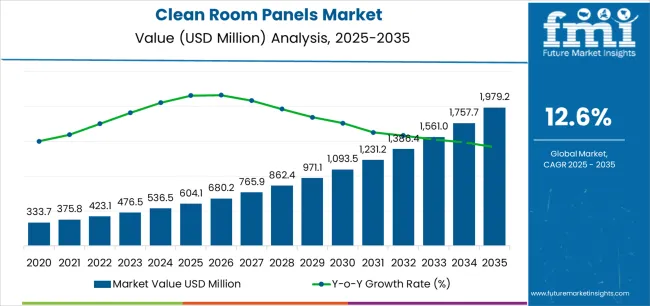
The market demonstrates distinct growth phases with varying market characteristics and competitive dynamics. Between 2025 and 2030, the market progresses through its technology adoption phase, expanding from USD 604.1 million to USD 931.8 million with steady annual increments averaging 12.6% growth. This period showcases the transition from basic panel formulations to advanced PVC-based systems with enhanced contamination control capabilities and integrated modular construction systems becoming mainstream features.
The 2025-2030 phase adds USD 327.7 million to market value, representing 39% of total decade expansion. Market maturation factors include standardization of cleanroom construction and contamination control protocols, declining component costs for specialized panel formulations, and increasing industry awareness of sterile environment benefits reaching optimal effectiveness in pharmaceutical manufacturing and semiconductor production applications. Competitive landscape evolution during this period features established cleanroom suppliers like AES Clean Technology, Inc. and Plascore, Inc. expanding their panel portfolios while specialty manufacturers focus on advanced material development and enhanced contamination control capabilities.
From 2030 to 2035, market dynamics shift toward advanced material integration and global manufacturing expansion, with growth continuing from USD 931.8 million to USD 1,979.2 million, adding USD 1,047.4 million or 61% of total expansion. This phase transition centers on specialized panel systems, integration with automated facility networks, and deployment across diverse pharmaceutical and electronics manufacturing scenarios, becoming standard rather than specialized applications. The competitive environment matures with focus shifting from basic contamination control capability to comprehensive sterile environment optimization systems and integration with facility monitoring platforms.
| Metric | Value |
|---|---|
| Market Value (2025) | USD 604.1 million |
| Market Forecast (2035) | USD 1,979.2 million |
| Growth Rate | 12.6% CAGR |
| Leading Technology | Cleanroom Wall Panels Product Type |
| Primary Application | Biotech & Pharmaceutical Industry End-User Segment |
The market demonstrates strong fundamentals with cleanroom wall panel systems capturing a dominant share through advanced contamination control design and facility optimization capabilities. Biotech & pharmaceutical applications drive primary demand, supported by increasing sterile manufacturing production and stringent regulatory technology requirements. Geographic expansion remains concentrated in developed markets with established pharmaceutical infrastructure, while emerging economies show accelerating adoption rates driven by healthcare manufacturing expansion and rising quality standards.
Market expansion rests on three fundamental shifts driving adoption across the biotech & pharmaceutical, food processing, and electronics sectors. First, regulatory compliance demand creates compelling operational advantages through clean room panels that provide immediate contamination control and sterile environment maintenance without compromising production goals, enabling manufacturers to meet stringent quality standards while maintaining facility productivity and reducing contamination risks. Second, pharmaceutical manufacturing modernization accelerates as drug producers worldwide seek advanced panel systems that complement traditional facility design, enabling precise contamination control customization and regulatory compliance that align with GMP standards and safety requirements.
Third, semiconductor production enhancement drives adoption from electronics manufacturers and precision production facilities requiring effective cleanroom solutions that maximize product yield while maintaining operational productivity during manufacturing and assembly operations. The growth faces headwinds from installation cost challenges that vary across panel suppliers regarding the pricing of modular systems and specialized materials, which may limit adoption in cost-sensitive environments. Technical limitations also persist regarding panel joint sealing and thermal insulation concerns that may reduce effectiveness in temperature-controlled or high-humidity conditions, which affect contamination performance and energy efficiency requirements.
The clean room panels market represents a specialized yet critical infrastructure opportunity driven by expanding global pharmaceutical production, contamination control modernization, and the need for superior sterile environments in diverse manufacturing applications. As manufacturers worldwide seek to achieve optimal contamination control effectiveness, reduce facility construction complexity, and integrate advanced panel systems with automated platforms, clean room panels are evolving from basic construction materials to sophisticated facility solutions ensuring regulatory compliance and contamination leadership.
The market's growth trajectory from USD 604.1 million in 2025 to USD 1,979.2 million by 2035 at a 12.6% CAGR reflects fundamental shifts in pharmaceutical industry regulatory requirements and contamination control optimization. Geographic expansion opportunities are particularly pronounced in Asia Pacific markets, while the dominance of wall panel systems and biotech & pharmaceutical applications provides clear strategic focus areas.
Strengthening the dominant cleanroom wall panels segment through enhanced structural formulations, superior contamination barriers, and modular installation systems. This pathway focuses on optimizing panel composition, improving contamination control performance, extending operational effectiveness to optimal sterile rates, and developing specialized formulations for diverse cleanroom classifications. Market leadership consolidation through advanced material engineering and modular design integration enables premium positioning while defending competitive advantages against alternative construction methods. Expected revenue pool: USD 152.6-205.8 million
Rapid pharmaceutical production and electronics manufacturing growth across Asia Pacific creates substantial expansion opportunities through local panel production capabilities and technology transfer partnerships. Growing biopharmaceutical manufacturing and government healthcare initiatives drive sustained demand for advanced cleanroom systems. Localization strategies reduce import costs, enable faster installation support, and position companies advantageously for pharmaceutical facility programs while accessing growing domestic markets. Expected revenue pool: USD 132.5-185.3 million
Expansion within the dominant biotech & pharmaceutical segment (35.7% market share) through specialized panel designs addressing GMP standards and sterile production requirements. This pathway encompasses automated environmental control systems, regulatory compliance integration, and compatibility with diverse pharmaceutical manufacturing processes. Premium positioning reflects superior contamination control and comprehensive regulatory support supporting modern pharmaceutical production. Expected revenue pool: USD 117.4-167.2 million
Strategic expansion into food industry applications (17.1% market share) requires enhanced hygiene capabilities and specialized formulations addressing food safety operational requirements. This pathway addresses sanitation performance enhancement, moisture resistance optimization, and FDA compliance with advanced material engineering for demanding food processing standards. Premium pricing reflects specialized hygiene requirements and extended durability standards. Expected revenue pool: USD 104.0-150.8 million
Development of specialized panel formulations for electronic & semiconductor applications (14.3% share) and other segments, addressing specific contamination requirements and ISO cleanroom classification demands. This pathway encompasses ESD-protected designs, ultra-clean manufacturing environments, and precision-optimized materials for emerging technology manufacturing. Technology differentiation through advanced contamination control enables diversified revenue streams while reducing dependency on pharmaceutical platforms. Expected revenue pool: USD 92.1-136.2 million
Expansion of PVC-based material segment (30.0% market share) through enhanced chemical resistance properties, cost-effective characteristics, and versatile application requirements. This pathway encompasses standard cleanroom applications, budget-conscious facility construction, and proven formulations requiring economical panel solutions. Market development through optimized material engineering enables differentiated positioning while accessing cost-conscious markets requiring reliable cleanroom solutions. Expected revenue pool: USD 81.6-122.9 million
Development of advanced modular construction systems addressing installation speed requirements and facility flexibility needs across cleanroom applications. This pathway encompasses pre-fabricated panel integration, rapid deployment capabilities, and comprehensive facility reconfiguration documentation. Premium positioning reflects construction leadership and installation expertise while enabling access to time-sensitive facility programs and flexible manufacturing partnerships. Expected revenue pool: USD 72.3-110.9 million
Primary Classification: The market segments by product type into Cleanroom Wall Panels, Cleanroom Ceiling Panels, Cleanroom Door Panels, Cleanroom Window Panels, Cleanroom Floor Panels, and Others categories, representing the evolution from basic wall construction to specialized integrated solutions for comprehensive cleanroom optimization.
Secondary Classification: End-user segmentation divides the market into Biotech & Pharmaceutical Industry, Food Industry, Electronic & Semiconductor Industry, Life Science and Medical Device Manufacturing, Research Institutes & Laboratories, Optical Industry, and Others sectors, reflecting distinct requirements for contamination control, regulatory compliance, and cleanroom classification standards.
Tertiary Classification: Material segmentation encompasses PVC Based, HPL Based, Aluminum Honeycomb Based, Cold Rolled Steel Based, Stainless Steel Based, GRP Based, and Others, demonstrating the diverse material compositions for panel construction.
The segmentation structure reveals technology progression from standard construction-based panels toward specialized contamination control systems with enhanced regulatory compliance and modular capabilities, while application diversity spans from pharmaceutical manufacturing to specialized semiconductor production requiring precise cleanroom solutions.
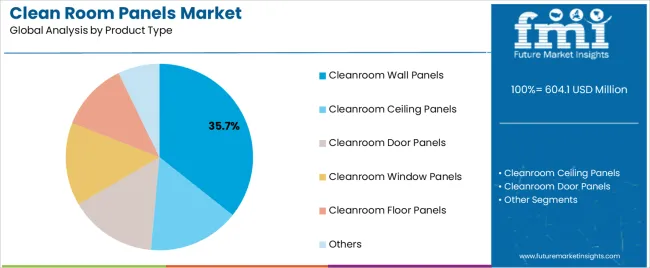
Market Position: Cleanroom wall panel systems command the leading position in the Clean Room Panels market with approximately 35.7% market share through advanced structural properties, including superior contamination barrier, premium surface smoothness capability, and installation flexibility that enable manufacturers to achieve optimal cleanroom integrity across diverse sterile environments.
Value Drivers: The segment benefits from facility designer preference for modular wall systems that provide consistent contamination control, reduced construction complexity, and operational versatility without requiring custom fabrication. Advanced panel features enable rapid facility construction, cleanroom classification compliance, and integration with HVAC systems, where wall integrity and contamination control represent critical facility requirements.
Competitive Advantages: Cleanroom wall panel systems differentiate through proven modular advantages, consistent surface characteristics, and integration with ceiling and floor systems that enhance contamination effectiveness while maintaining optimal sterile quality suitable for diverse pharmaceutical applications.
Key market characteristics:
Cleanroom ceiling panel systems maintain overhead infrastructure positioning in the Clean Room Panels market due to their HEPA integration properties and airflow management advantages. These systems appeal to manufacturers requiring efficient air distribution with adequate performance for controlled environment applications. Market adoption is driven by pharmaceutical facility expansion, emphasizing reliable contamination control and operational efficiency through optimized airflow systems while maintaining cleanroom classification standards.
Market Context: Biotech & pharmaceutical applications dominate the Clean Room Panels market with approximately 40.0% market share due to widespread adoption of sterile manufacturing facilities and increasing focus on GMP compliance, contamination prevention, and regulatory adherence applications that minimize product contamination while maintaining industry standards.
Appeal Factors: Pharmaceutical manufacturers prioritize contamination control reliability, regulatory compliance, and integration with existing production infrastructure that enables coordinated cleanroom operation across manufacturing facilities. The segment benefits from substantial pharmaceutical investment and quality assurance programs that emphasize the acquisition of certified cleanroom panels for regulatory compliance and product safety applications.
Growth Drivers: Pharmaceutical production expansion programs incorporate cleanroom panels as standard infrastructure for sterile manufacturing operations, while biologics industry growth increases demand for advanced contamination control capabilities that comply with FDA standards and minimize batch rejection rates.
Market Challenges: Varying regulatory requirements and facility design differences may limit panel standardization across different production facilities or international markets.
Application dynamics include:
Food industry applications capture approximately 17.1% market share through specialized hygiene requirements in food processing facilities, packaging operations, and quality control laboratories. These facilities demand sanitary panel systems capable of maintaining hygiene standards while providing exceptional moisture resistance and cleaning compatibility capabilities.
Market Position: PVC-based material systems command the leading position in the Clean Room Panels market with approximately 30.0% market share through widespread adoption in cost-effective cleanroom construction and standard contamination control applications requiring reliable performance and economical installation.
Value Drivers: The segment benefits from facility developer preference for economical panel materials that provide adequate contamination control, chemical resistance, and surface smoothness without requiring premium material investment. PVC-based panels enable standard cleanroom applications, versatile facility designs, and budget-conscious construction where cost-effectiveness and reliable performance drive material selection.
Competitive Advantages: PVC-based panel systems differentiate through proven cost advantages, consistent manufacturing quality, and compatibility with standard cleanroom requirements that ensure facility compliance while maintaining economical positioning suitable for diverse cleanroom classifications.
Growth Accelerators: Pharmaceutical production expansion drives primary adoption as clean room panels provide contamination control capabilities that enable drug manufacturers to meet regulatory standards without excessive facility costs, supporting sterile operations and quality missions that require precise environmental control applications. Cleanroom infrastructure demand accelerates market expansion as manufacturers seek effective contamination barrier systems that minimize particle generation while maintaining operational effectiveness during production and packaging scenarios. Healthcare industry spending increases worldwide, creating sustained demand for sterile facility systems that complement pharmaceutical manufacturing and provide regulatory optimization in competitive markets.
Growth Inhibitors: Installation cost challenges vary across panel suppliers regarding the pricing of modular systems and specialized materials, which may limit operational flexibility and market penetration in regions with capital constraints or cost-sensitive facility construction. Technical performance limitations persist regarding thermal insulation variations and joint sealing concerns that may reduce effectiveness in temperature-controlled cleanrooms or high-humidity conditions, affecting energy efficiency and contamination control requirements. Market fragmentation across multiple cleanroom classifications and facility standards creates compatibility concerns between different panel suppliers and existing infrastructure requirements.
Market Evolution Patterns: Adoption accelerates in pharmaceutical manufacturing and semiconductor production sectors where contamination control justifies facility costs, with geographic concentration in developed markets transitioning toward mainstream adoption in emerging economies driven by pharmaceutical expansion and regulatory awareness. Technology development focuses on enhanced material designs, improved thermal performance, and compatibility with automated environmental control systems that optimize contamination control and energy effectiveness. The market could face disruption if alternative construction technologies or prefabricated facility solutions significantly limit the deployment of traditional panel systems in cleanroom applications, though modular panel's unique combination of contamination control, construction flexibility, and regulatory compliance continues to make it preferred in pharmaceutical applications.
The Clean Room Panels market demonstrates varied regional dynamics with Growth Leaders including China (17.0% CAGR) and India (15.8% CAGR) driving expansion through pharmaceutical manufacturing capacity additions and healthcare infrastructure programs. Steady Performers encompass Germany (14.5% CAGR), United States (12.0% CAGR), and United Kingdom (10.7% CAGR), benefiting from established pharmaceutical industries and advanced cleanroom adoption. Mature Markets feature Japan (9.5% CAGR), where specialized semiconductor applications and premium cleanroom integration support consistent growth patterns.
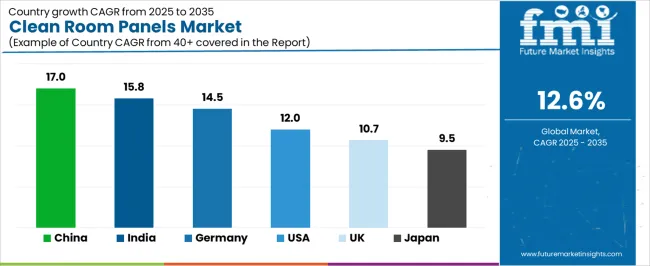
| Country | CAGR (2025-2035) |
|---|---|
| China | 17.0% |
| India | 15.8% |
| Germany | 14.5% |
| United States | 12.0% |
| United Kingdom | 10.7% |
| Japan | 9.5% |
Regional synthesis reveals Asia Pacific markets leading adoption through pharmaceutical manufacturing expansion and electronics production infrastructure development, while European countries maintain steady expansion supported by contamination control technology advancement and GMP standardization requirements. North American markets show moderate growth driven by biologics manufacturing applications and cleanroom facility integration trends.
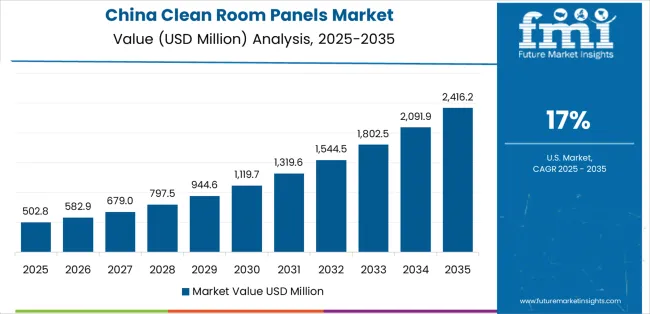
The Chinese market emphasizes advanced panel features, including precision contamination control and integration with comprehensive pharmaceutical manufacturing platforms that manage facility quality, environmental optimization, and efficiency applications through unified monitoring systems. The country demonstrates strong growth at 17.0% CAGR, driven by pharmaceutical manufacturing expansion, biologics production initiatives, and emerging healthcare development that support cleanroom integration. Chinese pharmaceutical manufacturers prioritize operational effectiveness with clean room panels delivering consistent contamination control through advanced material capabilities and facility adaptation features.
Technology deployment channels include major pharmaceutical manufacturers, specialized cleanroom contractors, and healthcare industry procurement programs that support professional applications for complex sterile manufacturing and vaccine production applications. Pharmaceutical platform integration capabilities with established production systems expand market appeal across diverse operational requirements seeking contamination control efficiency and compliance benefits. The expanding biologics sector and accelerating pharmaceutical export market create sustained demand, while innovative applications in cell therapy manufacturing and gene therapy production open new growth avenues.
Performance Metrics:
Germany's advanced pharmaceutical industry market demonstrates sophisticated panel deployment with documented operational effectiveness in premium sterile manufacturing applications and high-specification cleanroom facilities through integration with existing pharmaceutical systems and production infrastructure. The country leverages engineering expertise in contamination control and facility systems integration to maintain strong growth at 14.5% CAGR. Industrial centers, including Frankfurt, Munich, and Hamburg, showcase premium installations where panel systems integrate with comprehensive pharmaceutical platforms and quality management systems to optimize sterile production and contamination effectiveness.
German pharmaceutical manufacturers prioritize system precision and EU GMP compliance in panel development, creating demand for premium cleanroom systems with advanced features, including validated surface finishes and integrated environmental monitoring. The market benefits from established pharmaceutical infrastructure and a willingness to invest in advanced contamination control technologies that provide long-term quality benefits and compliance with international pharmaceutical and safety standards.
Market Intelligence Brief:
The USA clean room panels market demonstrates sophisticated deployment across biologics manufacturing applications with documented effectiveness in sterile drug production and cell therapy facilities through integration with comprehensive pharmaceutical management systems and operational infrastructure. The country leverages advanced manufacturing capabilities in pharmaceutical innovation and contamination control optimization technologies to maintain moderate growth at 12.0% CAGR. Industrial centers, including Boston, San Francisco, and North Carolina, showcase premium installations where panel systems integrate with comprehensive pharmaceutical platforms and distribution networks to optimize contamination efficiency and facility effectiveness.
American pharmaceutical manufacturers prioritize contamination control reliability and FDA compliance in panel selection, creating demand for innovative cleanroom systems with advanced features, including automated environmental monitoring and validation documentation capabilities. The market benefits from established pharmaceutical infrastructure and willingness to invest in advanced contamination control technologies that provide long-term compliance benefits and compatibility with cGMP and safety standards.
Market Intelligence Brief:
The UK clean room panels market demonstrates advanced quality deployment with documented operational effectiveness in pharmaceutical manufacturing applications and life science facilities through integration with existing GMP compliance systems and production infrastructure. The country leverages regulatory expertise in pharmaceutical standards and facility systems integration to maintain steady growth at 10.7% CAGR. Industrial centers, including London, Cambridge, and Manchester, showcase premium installations where panel systems integrate with comprehensive quality platforms and pharmaceutical management systems to optimize regulatory compliance and contamination effectiveness.
British pharmaceutical manufacturers prioritize system reliability and MHRA compliance in panel development, creating demand for certified cleanroom systems with advanced features, including validation protocols and quality assurance integration. The market benefits from established pharmaceutical infrastructure and commitment to invest in quality contamination control technologies that provide long-term operational benefits and compliance with UK and EU pharmaceutical standards. Sterile manufacturing applications, vaccine production systems, and cell therapy programs drive diversified demand across multiple pharmaceutical segments.
Strategic Market Indicators:
India's clean room panels market demonstrates rapid expansion deployment with documented operational effectiveness in pharmaceutical manufacturing applications and healthcare production facilities through integration with emerging pharmaceutical systems and production infrastructure. The country leverages growing industrial capabilities in pharmaceutical manufacturing and healthcare systems integration to achieve high growth at 15.8% CAGR. Industrial centers, including Hyderabad, Ahmedabad, and Bangalore, showcase expanding installations where panel systems integrate with comprehensive pharmaceutical platforms and distribution networks to optimize market penetration and contamination effectiveness.
Indian pharmaceutical manufacturers prioritize cost efficiency and quality standards in cleanroom development, creating demand for economical panel systems with advanced features, including GMP-compliant materials and quality control systems. The market benefits from expanding pharmaceutical manufacturing infrastructure and willingness to invest in international-standard contamination control technologies that provide facility optimization and compliance with global pharmaceutical standards.
Market Intelligence Brief:
Japan's clean room panels market demonstrates precision deployment with documented operational effectiveness in ultra-clean semiconductor manufacturing applications and specialty electronics facilities through integration with advanced production systems and quality control infrastructure. The country leverages engineering excellence in precision contamination control and manufacturing systems integration to maintain steady growth at 9.5% CAGR. Industrial centers, including Tokyo, Osaka, and Nagoya, showcase premium installations where panel systems integrate with comprehensive quality platforms and contamination optimization systems to optimize production excellence and cleanroom effectiveness.
Japanese semiconductor manufacturers prioritize system precision and contamination excellence in panel development, creating demand for ultra-premium cleanroom systems with advanced features, including ISO Class 1 compliance capabilities and precision surface finishes. The market benefits from established semiconductor infrastructure and commitment to invest in highest-quality contamination control technologies that provide superior product positioning and compliance with stringent Japanese manufacturing standards.
Strategic Market Indicators:
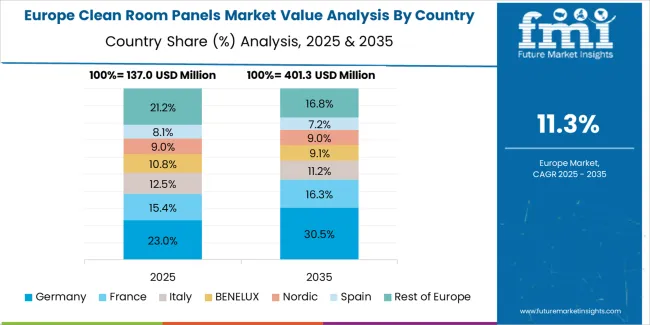
The Clean Room Panels market in Europe is projected to grow substantially over the forecast period, with Germany expected to maintain its leadership position with a significant market share supported by its advanced pharmaceutical infrastructure and major drug manufacturing centers in Frankfurt and Munich. France follows with strong market presence, driven by comprehensive pharmaceutical programs and biologics manufacturing initiatives. The United Kingdom holds substantial market share through specialized premium pharmaceutical activities, sterile manufacturing applications, and life science facility construction.
Italy commands notable market presence through strong pharmaceutical and medical device projects. Spain accounts for growing market share aided by pharmaceutical manufacturing expansion and cleanroom facility adoption. The Netherlands maintains steady share driven by specialty life science applications and contamination control demand. The Rest of Europe region is anticipated to show steady adoption, reflecting consistent growth in Nordic countries, pharmaceutical expansion in Central European markets, and cleanroom facility upgrades across Eastern European pharmaceutical production centers.
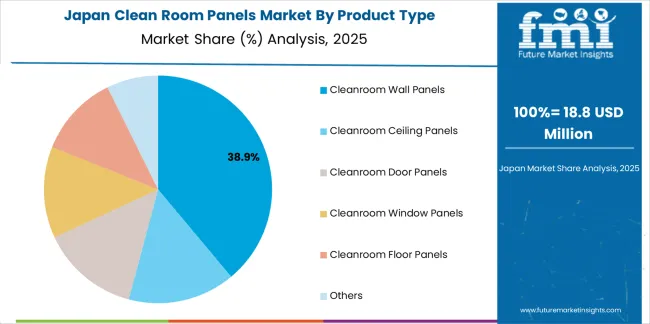
In Japan, the Clean Room Panels market prioritizes high-performance materials including stainless steel and aluminum honeycomb systems, which capture significant share of semiconductor and precision manufacturing installations due to their advanced features, including superior contamination control and ultra-clean surface characteristics.
Japanese semiconductor manufacturers emphasize precision, durability, and long-term performance excellence, creating demand for premium panel systems that provide consistent contamination control capabilities and superior cleanroom classification based on manufacturing requirements and ISO standards. PVC-based systems maintain positions in cost-sensitive applications and standard pharmaceutical installations where economical functionality meets operational requirements without compromising adequate contamination control.
Market Characteristics:
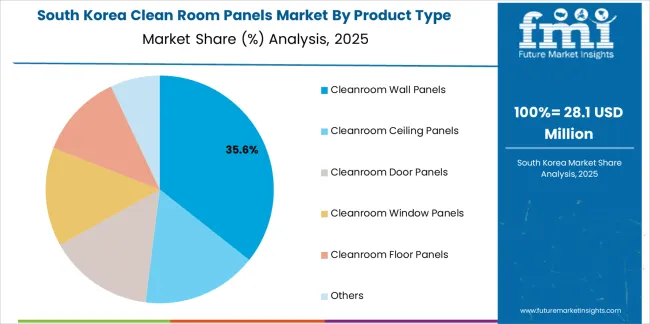
In South Korea, the market structure favors international cleanroom contractors and specialized panel manufacturers, including established suppliers and technology providers, which maintain dominant positions through comprehensive product portfolios and established pharmaceutical industry networks supporting both large-scale semiconductor cleanrooms and pharmaceutical facility installations.
These providers offer integrated solutions combining advanced panel systems with professional installation services and ongoing facility support that appeal to Korean pharmaceutical and electronics brands seeking reliable contamination control solutions. Local cleanroom contractors capture moderate market share by providing localized service capabilities and competitive pricing for standard cleanroom installations, while domestic manufacturers focus on specialized applications and cost-effective solutions tailored to Korean pharmaceutical market characteristics.
Channel Insights:
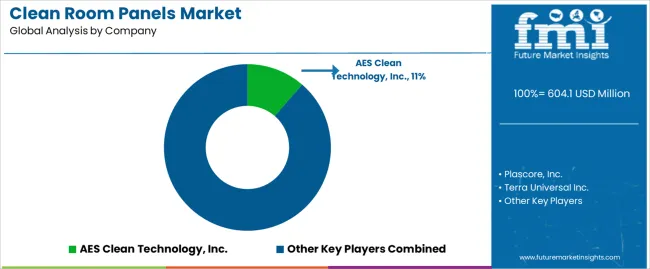
The market operates with moderate concentration, featuring approximately 15-25 meaningful participants, where leading companies control roughly 45-50% of the global market share through established pharmaceutical industry relationships and comprehensive cleanroom panel portfolios. Competition emphasizes advanced contamination control capabilities, material quality, and facility integration rather than price-based rivalry. The leading company, AES Clean Technology, Inc., commands approximately 11% market share through its extensive cleanroom panel product line and global pharmaceutical industry presence.
Market Leaders encompass AES Clean Technology, Inc., Plascore, Inc., and Terra Universal Inc., which maintain competitive advantages through extensive cleanroom expertise, global pharmaceutical networks, and comprehensive facility integration capabilities that create customer loyalty and support premium positioning. These companies leverage decades of contamination control experience and ongoing innovation investments to develop advanced cleanroom panel systems with precision contamination control and modular construction features. Technology Innovators include G-CON Manufacturing and regional specialists, which compete through specialized panel technology focus and innovative modular capabilities that appeal to pharmaceutical manufacturers seeking advanced solutions and facility optimization.
These companies differentiate through rapid facility development cycles and specialized pharmaceutical application focus. Regional Specialists feature cleanroom panel manufacturers focusing on specific geographic markets and specialized applications, including semiconductor-grade systems and integrated modular solutions. Market dynamics favor participants that combine reliable contamination control formulations with advanced facility capabilities, including precision environmental control and automatic monitoring integration features. Competitive pressure intensifies as traditional construction suppliers expand into specialty cleanroom systems, while specialized modular facility companies challenge established players through innovative panel solutions and prefabricated platforms targeting pharmaceutical manufacturing and semiconductor production segments.
| Item | Value |
|---|---|
| Quantitative Units | USD 604.1 million |
| Product Type | Cleanroom Wall Panels, Cleanroom Ceiling Panels, Cleanroom Door Panels, Cleanroom Window Panels, Cleanroom Floor Panels, Others |
| End User | Biotech & Pharmaceutical Industry, Food Industry, Electronic & Semiconductor Industry, Life Science and Medical Device Manufacturing, Research Institutes & Laboratories, Optical Industry, Others |
| Material | PVC Based, HPL Based, Aluminum Honeycomb Based, Cold Rolled Steel Based, Stainless Steel Based, GRP Based, Others |
| Regions Covered | Asia Pacific, Europe, North America, Latin America, Middle East & Africa |
| Countries Covered | China, India, Germany, United States, United Kingdom, Japan, and 20+ additional countries |
| Key Companies Profiled | AES Clean Technology, Inc., Plascore, Inc., Terra Universal Inc., G-CON Manufacturing, Pacific Panels Inc. |
| Additional Attributes | Dollar sales by product type, end-user, and material categories, regional adoption trends across Asia Pacific, Europe, and North America, competitive landscape with cleanroom contractors and panel manufacturers, manufacturer preferences for contamination control reliability and regulatory compliance, integration with pharmaceutical production platforms and environmental monitoring systems, innovations in modular construction formulations and contamination control excellence, and development of GMP-compliant solutions with enhanced performance and facility optimization capabilities. |
The global clean room panels market is estimated to be valued at USD 604.1 million in 2025.
The market size for the clean room panels market is projected to reach USD 1,979.2 million by 2035.
The clean room panels market is expected to grow at a 12.6% CAGR between 2025 and 2035.
The key product types in clean room panels market are cleanroom wall panels, cleanroom ceiling panels, cleanroom door panels, cleanroom window panels, cleanroom floor panels and others.
In terms of product type, cleanroom wall panels segment to command 35.7% share in the clean room panels market in 2025.






Full Research Suite comprises of:
Market outlook & trends analysis
Interviews & case studies
Strategic recommendations
Vendor profiles & capabilities analysis
5-year forecasts
8 regions and 60+ country-level data splits
Market segment data splits
12 months of continuous data updates
DELIVERED AS:
PDF EXCEL ONLINE
Cleaning Robot Market Size and Share Forecast Outlook 2025 to 2035
Cleansing Micelle Technology Market Analysis - Size and Share Forecast Outlook 2025 to 2035
Clean Labelled Food Additives Market Size and Share Forecast Outlook 2025 to 2035
Clean Label Flour Market Size and Share Forecast Outlook 2025 to 2035
Cleaning In Place Market Growth - Trends & Forecast 2025 to 2035
Clean-Label Ingredients Market Size, Growth, and Forecast for 2025 to 2035
Clean Steam Separator Market Analysis - Size, Share & Forecast 2025 to 2035
Clean Label Flavors Market Analysis by Liquid Systems, Spray-Dried Powders, Encapsulated Flavors, Emulsion-Based Delivery Systems Through 2035
Clean Label Pectin Market Analysis – Growth & Industry Trends 2025 to 2035
Clean Coal Technology Market Growth - Trends & Forecast 2025 to 2035
Cleaning and Hygiene Product Market Report – Demand & Trends 2024-2034
Clean Label Starch Market
Cleanroom Static Transfer Box Market Size and Share Forecast Outlook 2025 to 2035
Cleanroom and Lab Surface Contamination Control Products Market Size and Share Forecast Outlook 2025 to 2035
Cleanroom Construction Market Size and Share Forecast Outlook 2025 to 2035
Cleanroom Technologies Market Growth – Trends & Forecast 2025 to 2035
Cleanroom Flooring Market Growth - Trends & Forecast 2024 to 2034
Cleanroom Lighting Market
Clean Room Robot Market Size and Share Forecast Outlook 2025 to 2035
Dry Cleaning Solvents Market Size and Share Forecast Outlook 2025 to 2035

Thank you!
You will receive an email from our Business Development Manager. Please be sure to check your SPAM/JUNK folder too.
Chat With
MaRIA